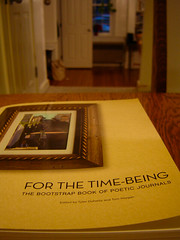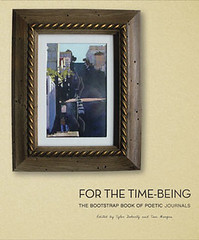***This list appears in
For the Time Being. Please feel free to suggest titles in the comments section***
IN AND AROUND POETIC JOURNALS: A SELECTED BOOKLIST *With thanks to Andrew Schelling, who pointed us toward many of these titles.
Ashbery, John: The Vermont Notebook.
Berrigan, Ted: Train Ride.
Blackburn, Paul: The Journals.
Brainard, Joe: Bolinas Journal.
Cendrars, Blaise: Prose of the Trans-Siberian & of the Little Jeanne de France.
Creeley, Robert: A Day Book; Pieces; Hello: A Journal.
Corbett, William: Collected Poems.
Dahlen, Beverly: A Reading.
Denby, Edwin: Mediterranean Cities.
Doherty, Tyler: Bodhidharma Never Came to Hatboro.
Duggan, Laurie: Compared to What.
Duncan, Robert: The HD Book: Part II, A Day Book.
Eigner, Larry: Readiness / Enough / Depends / On; Windows / Walls / Yard / Ways.
Fischer, Norman: The Narrow Roads of Japan; Success.
Gallagher, Ryan: Plum Smash and other Flashbulbs.
Ginsberg, Allen: Planet News; The Fall of America.
Giscombe, C.S.: Into and Out of Dislocation.
Grenier, Robert: Series; A Day at the Beach.
Hahn, Kimiko: The Narrow Road to the Interior.
Kerouac, Jack: Book of Dreams; Some of the Dharma; Book of Sketches.
Kyger, Joanne: Again; As Ever; Just Space; Patzcuaro; Japan and India Journals; Phenomenological.
Lehman, David: The Daily Mirror.
Mathews, Harry: 20 Lines a Day.
Mayer, Bernadette: Studying Hunger; Midwinter’s Day.
Oppen, George: Day Books.
Padgett, Ron: The Albanian Journal.
Ratcliffe, Stephen: Human/Nature; Real; Cloud/Ridge.
Reznikoff, Charles: Collected Poems.
Rothenberg, Michael: An Unhurried Vision, The Paris Journals.
Roussel, Raymond: New Impressions of Africa.
Schelling, Andrew: The Road to Ocosingo; Two Elk: A High Country Notebook.
Schuyler, James: The Dairy of James Schuyler; Collected Poems.
Schuyler, James & Darragh Park: Two Journals.
Silliman, Ron: BART; Xing.
Sloman, Joel: Cuban Journal.
Snyder, Gary: Passage Through India; Earth House Hold; The Gary Snyder Reader.
Snyder, Gary & Tom Killion: The High Sierra of California.
Waldman, Anne: Journals & Dreams.
Weiner, Hannah: Clairvoyant Journal; The Fast; Country Girl.
Whalen, Philip: Every Day; The Goof Book; Scenes of Life at the Capital.
Wieners, John: 707 Scott Street.
Williams, William Carlos: Descent of Winter.
Studies & Translations from the Japanese TraditionBasho, Matsuo: Oku no Hosomichi (various translations—Corman, Hamill, Miner, Keene, Sato, Yuasa); The Narrow Road to the Deep North and Other Travel Sketches. Translated by Nobuyuki Yuasa.
Brazel, Karen: Diary of Lady Nijo.
Cranston, Edwin: The Izumi Shikabu Diary.
Keene, Donald: Travelers of 100 Ages: The Japanese Through Their Diaries; As I Crossed a Bridge of Dreams: Recollections of a Woman in 11th Century Japan; Essays in Idleness: The Tsurezuregusa of Kenko; Modern Japanese Journals.
Miner, Earl: Japanese Poetic Diaries. (Includes the Tosa Diary & Diary of Izumi Shikibu)
Morris, Ivan: The Pillow Book of Sei Shonagon; The World of the Shining Prince.
Murasaki: Diary of Lady Muraskai. Translated by Richard Bowering.
Santoka: For All My Walking.
Seidensticker, Edward: The Gossamer Years: A Diary by a Noblewoman of Heian Japan.
Shiki, Masaoka: Selected Poems. Translated by Burton Watson.
 Check out Ron Silliman's review of For the Time Being: The Bootstrap Book of Poetic Journals.
Check out Ron Silliman's review of For the Time Being: The Bootstrap Book of Poetic Journals.

